

Www.sidran.org/pdf/Hope_for_Recovery.pdf. Help for Post Traumatic Stress (PTSD) and dissociation. By Laura S.
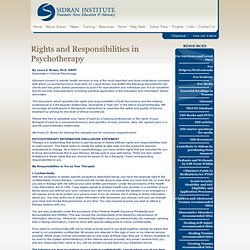
Brown, Ph.D. ABPP Diplomate in Clinical Psychology Informed consent in mental health services is one of the most important and least understood concepts with which consumer/survivors must deal. Dr. Laura Brown has written the following document for her clients and has given Sidran permission to post it for reproduction and individual use. This document, which specifies the rights and responsibilities of both the survivor and the helping professional in a therapeutic relationship, represents a "high bar" in the ethics of psychotherapy. Please feel free to substitute your name (if used by a helping professional) or the name of your therapist (if used by a consumer/survivor), and specifics of roles, policies, rates, etc. agreed upon in a specific psychotherapy relationship. We thank Dr. PSYCHOTHERAPY INFORMATION DISCLOSURE STATEMENT Therapy is a relationship that works in part because of clearly defined rights and responsibilities held by each person.
Help for Post Traumatic Stress (PTSD) and dissociation. Therapy for Post-Traumatic Stress and Dissociative Conditions:What to Look for and How to Choose a Therapist One of the primary roles of Sidran Institute’s Help Desk is to assist people who have been traumatized in finding various kinds of help.
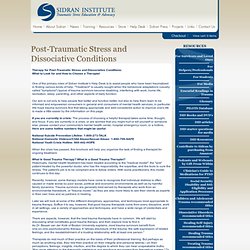
"Treatment" is usually sought when the behavioral adaptations (usually called "symptoms") typical of trauma survivors become disabling, interfering with work, home life, recreation, sleep, parenting, and other aspects of daily function. Our aim is not only to help people feel better and function better, but also to help them learn to be informed and empowered consumers in general and consumers of mental health services, in particular.
We hope trauma survivors find that taking appropriate and well-considered action to improve one's life is made a little easier by the information on this page. If you are currently in crisis: The process of choosing a helpful therapist takes some time, thought, and focus. Help for Post Traumatic Stress (PTSD) and dissociation. Copyright 2010 Sidran Traumatic Stress Institute IntroductionDissociative Identity Disorder (DID) (known in the past as Multiple Personality Disorder-MPD) and other Dissociative Disorders are now understood to be fairly common effects of severe trauma in early childhood.
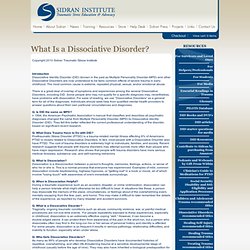
The most common cause is extreme, repeated physical, sexual, and/or emotional abuse. There is a great deal of overlap of symptoms and experiences among the several Dissociative Disorders, including DID. Some people who may not qualify for a specific diagnosis may, nevertheless, have problems with dissociation. For ease of reading, we use “Dissociative Disorders” as a general term for all of the diagnoses. Q: Is DID the same as MPD? Q: What Does Trauma Have to Do with DID? Q: What Is Dissociation? Q: When Is Dissociation Helpful? Q: What is a Dissociative Disorder? Q: Who Gets Dissociative Disorders? Q: Does DID Affect Both Women and Men?
Help for Post Traumatic Stress (PTSD) and dissociation. This public service brochure was developed by the Sidran Institute in conjunction with The Sheppard and Enoch Pratt Health System.
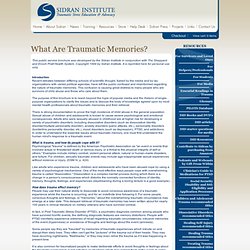
Copyright 1994 by Sidran Institute. It is reprinted here for personal use only. Introduction Recent debates between differing schools of scientific thought, fueled by the media and by lay organizations with varied political agendas, have left the public confused and misinformed regarding the nature of traumatic memories. This confusion is causing great distress to many people who are survivors of child abuse and those who care about them. The purpose of this brochure is to reach beyond the hype of popular media and the rhetoric of single-purpose organizations to clarify the issues and to discuss the body of knowledge agreed upon by most mental health professionals about traumatic memories and their retrieval.
There is strong documentation to prove the high incidence of child abuse in the general population. What is trauma, and how do people cope with it? Help for Post Traumatic Stress (PTSD) and dissociation. Help for Post Traumatic Stress (PTSD) and dissociation. This brochure is copyright 2000 by the Sidran Institute and is reprinted here for personal use only.
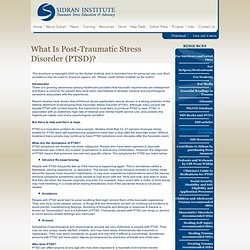
Brief quotations may be used in research papers, etc. Please credit Sidran Institute as the author.Introduction There is a growing awareness among healthcare providers that traumatic experiences are widespread and that it is common for people who have been traumatized to develop medical and psychological symptoms associated with the experience. Recent studies have shown that childhood abuse (particularly sexual abuse) is a strong predictor of the lifetime likelihood of developing Post-Traumatic Stress Disorder (PTSD). Although many people still equate PTSD with combat trauma, the experience most likely to produce PTSD is rape. PTSD is associated with an extremely high rate of medical and mental health service use, and possibly the highest per-capita cost of any psychological condition. Document2.